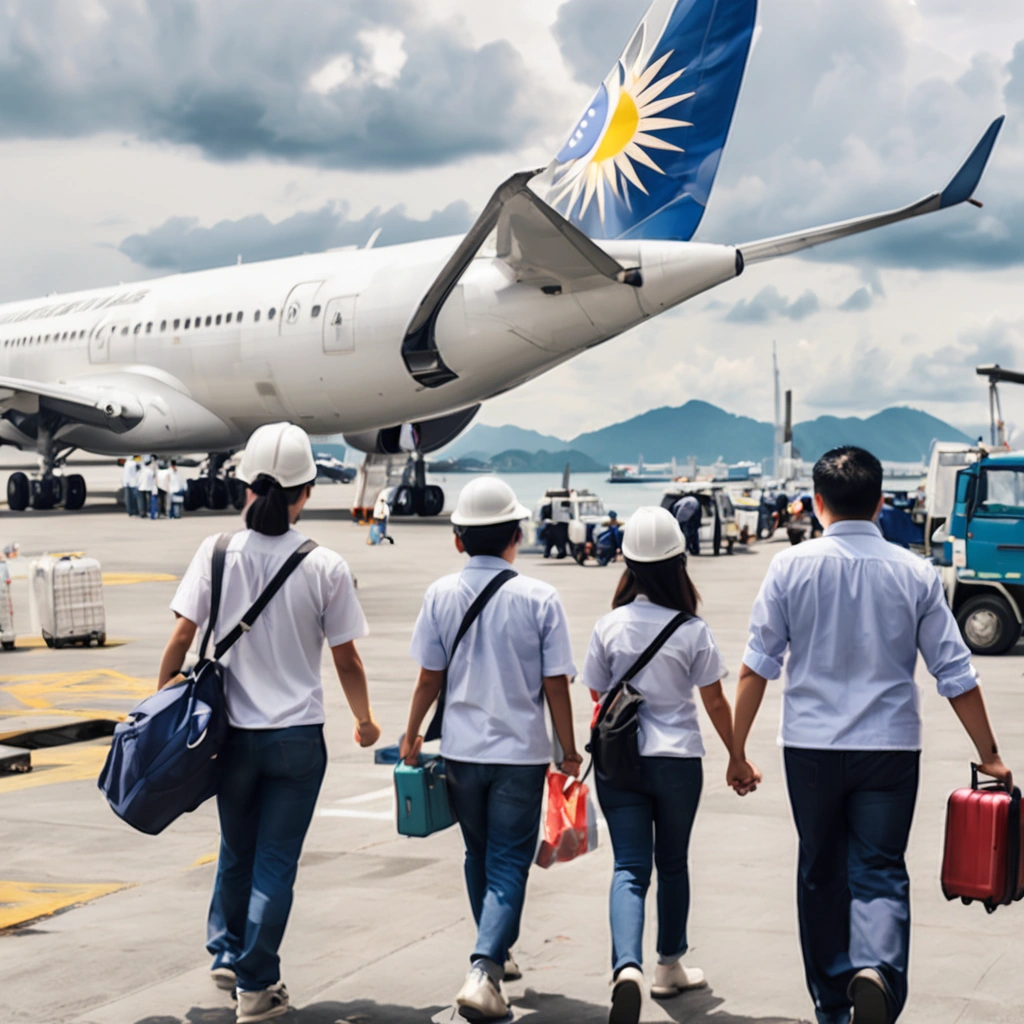OFW Rights in the Next Decade: A Comprehensive Guide to Legal Protections (2030-2039)
Protecting the Modern-Day Heroes: A Guide to OFW Rights in the Next Decade
The Philippines, a nation deeply intertwined with the stories of its Overseas Filipino Workers (OFWs), faces a critical juncture. As we look towards 2030 and beyond, ensuring the rights and protections of these modern-day heroes is paramount. These individuals, contributing significantly to the nation’s economy through remittances, often navigate complex legal landscapes and face vulnerabilities far from home. This guide serves as a comprehensive resource, outlining their rights and available legal remedies under Philippine and international law.
The recent passing of Rep. Edcel Lagman, a staunch advocate for human rights, serves as a poignant reminder of the ongoing fight for the vulnerable, and the need to ensure their protection. The economic lifeline provided by Overseas Filipino Workers necessitates a robust framework of OFW rights, encompassing pre-departure preparations, on-site welfare, and avenues for legal assistance for OFWs when disputes arise. Philippine law, particularly the Migrant Workers and Overseas Filipinos Act of 1995 (Republic Act No. 8042, as amended), forms the cornerstone of these protections, yet persistent challenges remain in its effective implementation and enforcement across diverse host countries.
Protecting OFWs requires a multi-faceted approach involving government agencies like the POEA and OWWA, as well as active engagement from civil society organizations and the OFWs themselves. As the global landscape evolves, so too must the strategies for protecting OFWs. The rise of new technologies presents both opportunities and challenges. Digital platforms can facilitate access to information about OFW rights and streamline the process of seeking legal assistance for OFWs. However, they also create new avenues for exploitation, such as online recruitment scams and cyber-bullying.
Strengthening OFW laws and OFW regulations must include provisions to address these emerging threats. Furthermore, international cooperation is crucial. Bilateral agreements with host countries can ensure fair wages, safe working conditions, and access to justice for OFWs facing contract violations or illegal termination. The Philippine government, through agencies like the POEA and OWWA, plays a vital role in safeguarding OFW rights. These agencies are responsible for regulating recruitment agencies, providing pre-departure training, and offering legal assistance for OFWs in distress.
However, bureaucratic inefficiencies and a lack of resources can hinder their effectiveness. Streamlining processes, increasing funding, and enhancing coordination between government agencies are essential to improve the delivery of services to OFWs. Moreover, empowering OFWs with knowledge of their rights and responsibilities is critical. Awareness campaigns, educational materials, and accessible legal advice can help OFWs make informed decisions and protect themselves from exploitation. Combating illegal recruitment, ensuring fair wages, and facilitating repatriation in cases of abuse are paramount to upholding the dignity and well-being of Overseas Filipino Workers.
Looking ahead, the future of OFW rights hinges on a proactive and adaptive approach. This includes strengthening enforcement mechanisms to combat illegal recruitment and hold abusive employers accountable. It also requires investing in programs that promote the reintegration of returning OFWs into the Philippine economy. By fostering a supportive environment that values their contributions and protects their rights, the Philippines can ensure that its modern-day heroes are treated with the respect and dignity they deserve. Addressing issues such as excessive recruitment fees, ensuring access to safe working conditions, and providing comprehensive support in cases of contract violations are essential steps towards a more just and equitable future for Overseas Filipino Workers.
Pre-Departure Rights: Securing Your Future Before You Leave
Before embarking on their overseas journey, OFWs possess specific pre-departure rights enshrined in Philippine law, designed to safeguard them from exploitation and ensure a fair start to their employment abroad. Recruitment agencies, acting as intermediaries, are heavily regulated under Philippine law to prevent abuses such as charging exorbitant recruitment fees. The POEA (Philippine Overseas Employment Administration) meticulously sets the standard allowable recruitment fees, and any agency demanding amounts exceeding these limits is in direct violation of OFW laws.
This regulation is a critical component of protecting OFWs from financial burdens before they even begin earning, ensuring they aren’t saddled with debt before their deployment. OFWs should be vigilant in understanding these regulations and reporting any suspected violations to the POEA. Access to legal assistance for OFWs at this stage is crucial, allowing them to understand their rights and recourse options should they encounter unscrupulous recruiters. Contracts offered to Overseas Filipino Workers must be clear, comprehensive, and presented in a language the OFW understands, a critical element in protecting OFWs from potential contract violations.
These contracts must explicitly detail the nature of the job, the agreed-upon salary, working hours, and all other benefits, leaving no room for ambiguity. OFWs are strongly advised to meticulously scrutinize these contracts, seeking clarification from the POEA or legal assistance for OFWs if any clause seems unclear or unfavorable. According to a 2023 study by the Blas F. Ople Policy Center, approximately 30% of OFW disputes stem from misunderstandings or discrepancies in employment contracts, highlighting the importance of pre-departure contract review.
Understanding Philippine law as it pertains to overseas employment is paramount for OFWs before signing any agreement. A recent and promising development in protecting OFWs is the exploration of smart contracts, leveraging blockchain technology to ensure transparency and immutability of employment terms, significantly reducing the potential for future disputes and illegal termination. Imagine a system where employment terms are coded onto a blockchain, providing an unalterable record accessible to both the worker and the employer.
This innovative approach, although still in its nascent stages, offers a powerful tool for enforcing OFW rights and preventing contract violations. This technological advancement aligns with the government’s commitment to strengthening OFW regulations and providing robust legal remedies for OFWs facing unfair labor practices. The integration of blockchain into OFW contracts represents a significant step towards a more secure and equitable future for Overseas Filipino Workers, enhancing fair wages and safe working conditions. The OWWA (Overseas Workers Welfare Administration) also plays a role in pre-departure orientation seminars, educating OFWs on their rights and available resources.
On-Site Rights: Ensuring Fair Treatment and Safe Working Conditions
Once deployed, OFWs are entitled to on-site rights that guarantee fair treatment and safe working conditions. These rights are protected by both Philippine law and international labor standards. Fair wages are a fundamental right, and OFWs should receive compensation equal to that of local workers in similar positions, adhering to the principle of equal pay for equal work. This encompasses not only the base salary but also overtime pay, holiday pay, and other benefits mandated by the host country’s labor laws, as well as those stipulated in the employment contract validated by the POEA.
Employers who attempt to circumvent these regulations by offering lower wages or withholding benefits are in direct violation of both Philippine law and international labor conventions, potentially facing legal repercussions and blacklisting from future recruitment activities. The Philippine government, through its various embassies and labor offices, actively monitors wage practices to ensure compliance and provides legal assistance for OFWs facing wage-related disputes. Safe working conditions are also paramount. Employers are legally obligated to provide a safe and healthy work environment, free from hazards and risks.
This includes providing adequate safety equipment, proper training on workplace safety procedures, and regular inspections to identify and mitigate potential hazards. The Occupational Safety and Health Center (OSHC) of the Philippines provides guidelines and training programs that can be adapted for OFWs in various industries. For instance, OFWs working in construction or manufacturing are entitled to protective gear such as helmets, safety boots, and gloves, while those exposed to hazardous substances should receive proper training on handling these materials safely.
Failure to provide a safe working environment can lead to employer liability for any resulting injuries or illnesses, and OFWs have the right to refuse work that poses an imminent danger to their health and safety. Access to healthcare is another critical right. OFWs should have access to adequate medical care and insurance coverage to address any health issues that may arise during their employment. This often includes enrollment in the host country’s national health insurance scheme or a private health insurance plan provided by the employer.
The Overseas Workers Welfare Administration (OWWA) also provides medical assistance and support to OFWs in need, including coverage for hospitalization, medication, and repatriation for medical reasons. OFWs should familiarize themselves with their healthcare entitlements and know how to access medical services in their host country. It is crucial to keep copies of their health insurance documents and contact information for local healthcare providers. Beyond these fundamental rights, OFWs are also entitled to freedom from discrimination and harassment.
Philippine law and international conventions prohibit discrimination based on gender, religion, ethnicity, or other protected characteristics. Employers must create a workplace culture that respects diversity and promotes equality. OFWs who experience discrimination or harassment have the right to file a complaint with the appropriate authorities, both in the host country and through Philippine labor offices. Legal assistance for OFWs facing such issues is available through various organizations, including the Integrated Bar of the Philippines (IBP) and non-governmental organizations specializing in migrant worker rights.
Documenting instances of discrimination or harassment is crucial for building a strong case and seeking appropriate remedies. Contract substitution and illegal termination are also significant concerns that undermine OFW rights. Contract substitution, where an employer alters the terms of the employment contract after the OFW has arrived in the host country, is strictly prohibited under Philippine law. OFWs have the right to refuse to accept these altered terms and demand enforcement of the original contract validated by the POEA. Illegal termination, where an OFW is dismissed without just cause or due process, is also a violation of their rights. In such cases, OFWs are entitled to compensation for the unexpired portion of their contract, as well as other damages. Seeking immediate legal assistance for OFWs facing contract violations or illegal termination is crucial to protect their interests and pursue appropriate legal remedies, potentially including repatriation assistance and pursuing claims for damages.
Legal Remedies and Repatriation: Seeking Justice and Returning Home
Contract violations, abuse, and illegal termination represent significant threats to the well-being and financial security of Overseas Filipino Workers (OFWs). Fortunately, Philippine law provides avenues for redress, and a network of support systems exists to aid OFWs in navigating these challenging situations. The Philippine Overseas Employment Administration (POEA) stands as the primary government body tasked with addressing complaints related to recruitment violations and contract disputes. OFWs facing issues such as excessive recruitment fees or breaches of contract terms can file formal complaints with the POEA.
The agency conducts thorough investigations, and when warranted, imposes sanctions ranging from fines and suspension of licenses to the blacklisting of unscrupulous recruitment agencies or employers. This process is governed by specific OFW regulations designed to protect workers from exploitation. The Overseas Workers Welfare Administration (OWWA) complements the POEA’s efforts by offering a broader range of support services to OFWs in distress. These services encompass legal assistance for OFWs, counseling, and critically, repatriation assistance. OWWA provides crucial aid in facilitating the return of OFWs who have experienced abuse, illegal termination, or other emergencies, ensuring they have a safe passage home.
Furthermore, OWWA offers post-repatriation programs aimed at helping OFWs reintegrate into Philippine society, including livelihood training and financial assistance. Data from OWWA indicates that repatriation requests have seen a steady increase in recent years, highlighting the continued need for robust support systems. For cases involving severe abuse, exploitation, or illegal termination, OFWs have the right to seek legal representation and pursue lawsuits in Philippine courts or, where applicable, international tribunals. The Philippine government has established legal aid programs specifically designed to assist OFWs in navigating the complexities of the legal system, both domestically and abroad.
Moreover, international organizations like the International Labour Organization (ILO) play a vital role in protecting OFW rights by advocating for fair labor practices and investigating reports of abuse. OFWs can report instances of mistreatment to the ILO, which can then engage with the relevant authorities to ensure their rights are upheld. Protecting OFWs also involves ensuring fair wages and safe working conditions, as mandated by both Philippine law and international labor standards. Repatriation rights are a cornerstone of OFW protection, ensuring that those who have suffered abuse or illegal termination can return home safely and with dignity.
The Philippine government is legally obligated to provide comprehensive assistance to OFWs requiring repatriation, including covering airfare costs and offering temporary shelter and support upon arrival. In situations where employers fail to honor their contractual obligations, OFWs should actively pursue legal assistance to recover unpaid wages, benefits, and damages. Landmark cases involving OFWs have demonstrated the importance of diligent legal action in securing justice and compensation for those who have been wronged. Continuous improvements to OFW laws and OFW regulations are essential to address emerging challenges and ensure the ongoing protection of these vulnerable workers.
The Future of OFW Rights: Embracing Technology and Strengthening Protections
The legal landscape surrounding OFW rights is constantly evolving, demanding continuous adaptation and innovation. Recent updates to OFW laws and OFW regulations demonstrate the Philippine government’s ongoing commitment to strengthening protections for these workers. A significant development is the intensified focus on combating illegal recruitment, a persistent threat to Overseas Filipino Workers. The government, through the POEA, has intensified its efforts to prosecute illegal recruiters, conducting widespread awareness campaigns to educate potential OFWs about the severe risks of engaging with unregistered agencies.
These campaigns emphasize the importance of verifying agency credentials and understanding the legal avenues available for recourse in cases of fraud or exploitation, reinforcing the commitment to protecting OFWs from the outset. Another critical area of focus involves enhancing welfare services provided to OFWs and their families. OWWA has expanded its programs to offer more comprehensive healthcare coverage, skills training initiatives, and livelihood assistance programs designed to support OFWs upon their return to the Philippines.
These initiatives aim to ensure that OFWs not only have access to immediate assistance during their overseas employment but also receive the necessary support for reintegration into Philippine society. Furthermore, OWWA is actively working to streamline its processes for accessing benefits and services, making it easier for OFWs and their families to navigate the system and receive the assistance they need, particularly in cases involving contract violations or the need for repatriation. Looking ahead, the future of protecting OFWs hinges on leveraging technology, particularly artificial intelligence (AI), to create a more robust safety net.
AI-powered platforms can play a pivotal role in identifying and flagging potentially fraudulent job offers, providing real-time legal assistance for OFWs in distress, and facilitating seamless communication between OFWs and their families back home. Imagine an AI system that scans job postings for red flags indicative of trafficking or unfair labor practices, instantly alerting potential victims and relevant authorities. Moreover, AI could provide instant translation services for legal documents and facilitate access to legal assistance for OFWs facing issues like illegal termination or disputes over fair wages. This proactive approach, combining technology with strengthened legal frameworks, promises to safeguard the rights and well-being of Overseas Filipino Workers in the coming decade, ensuring that they receive the legal assistance for OFWs they deserve and are protected from exploitation and abuse. The focus must remain on upholding OFW rights and ensuring access to justice under Philippine law, fostering a future where OFWs can contribute to the nation’s prosperity with dignity and security.


